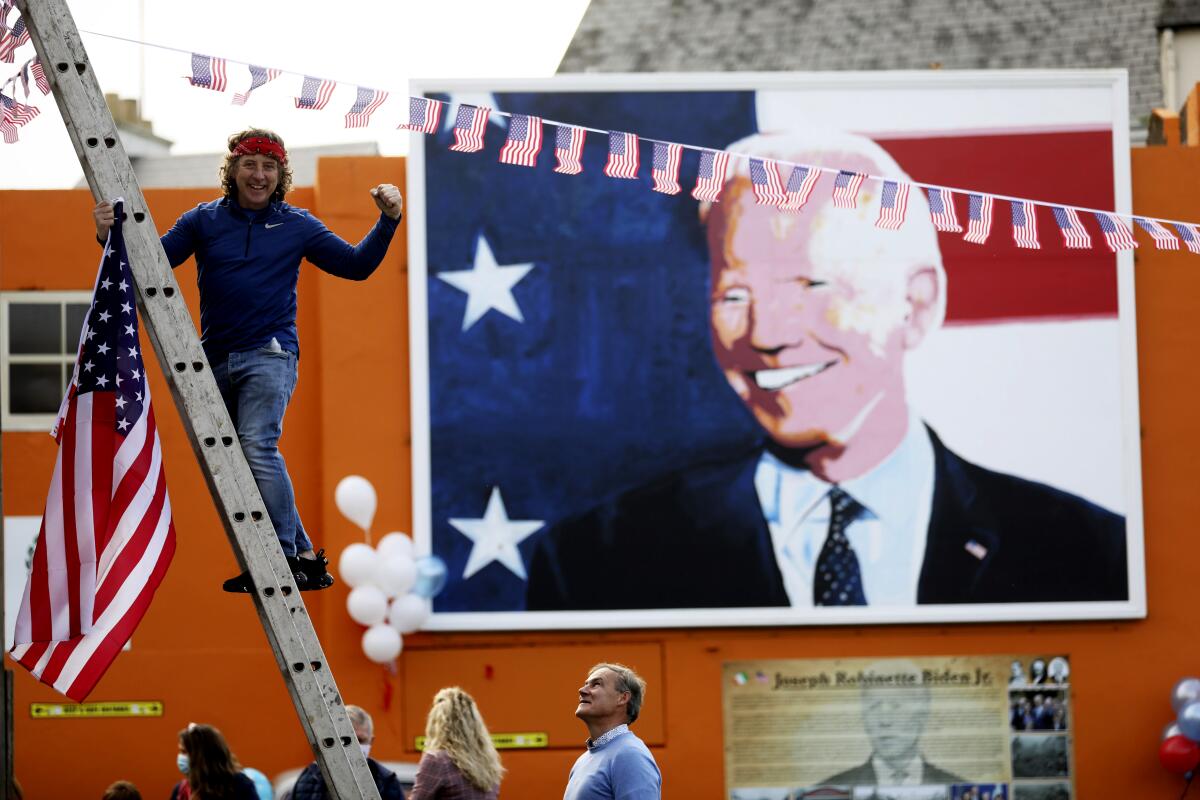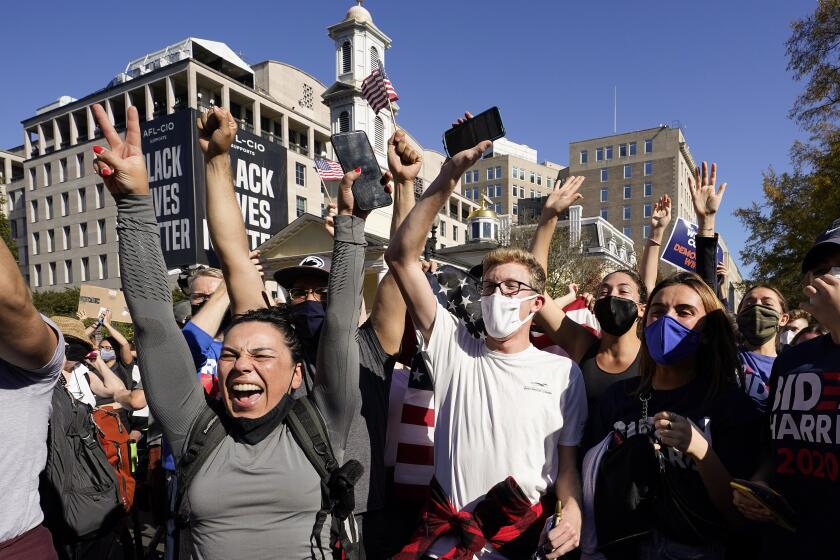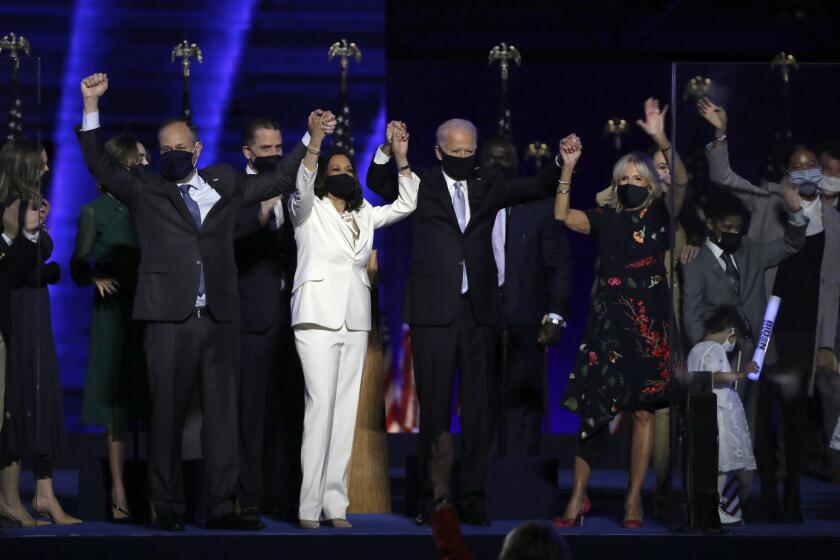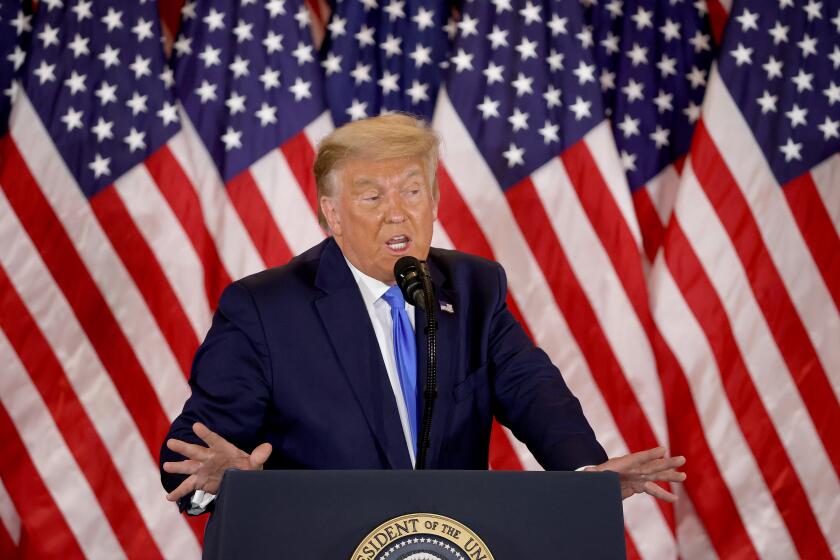The world reacts as Joe Biden becomes U.S. president-elect

- Share via
WASHINGTON — Much of the world Saturday welcomed the election of Joe Biden as the next president of the United States after several suspenseful days of vote counting. But rebuilding respect for the U.S. on the global stage remains a work in progress.
Television screens across continents were packed with images of jubilant Americans in New York, Washington and Los Angeles celebrating Biden’s capture of the required number of electoral votes to become the 46th president. Dozens of world leaders rushed to congratulate Biden and running mate Sen. Kamala Harris, not bothering to wait for President Trump to concede.
“Welcome back America!” Paris Mayor Anne Hidalgo tweeted.
Her London counterpart, Sadiq Khan, who had tussled with Trump over his disparagement of Muslims, reacted in the same vein: “It’s time to get back to building bridges, not walls.”
“Donald Trump: the loser who hated losers,” declared the headline in El País, one of Spain’s leader newspapers. “The end of the delirium,” Mexico magazine Proceso said.
German Chancellor Angela Merkel, who four years ago issued a backhanded congratulations to Trump on his election, while also warning of dangers to democracy, was quick to praise the Biden-Harris victory. She has had possibly the most contentious relationship with Trump of any major ally.
“Congratulations! The American citizens have made their decision,” Merkel said in a statement. “I am looking forward to working with President Biden in the future. Our transatlantic friendship is irreplaceable if we want to master the great challenges of our time.”
Tell us where you were and what you did when Joe Biden won the 2020 election. We may feature your story in our coverage.
Among friends and foes alike, many governments are assessing how their diplomatic, trade and security ties with Washington will change. Under Trump, autocratic governments such as Saudi Arabia escaped harsh criticism for human rights abuses and will chafe at Biden’s pledge to restore the issue to foreign policy decisions. Allies said they hoped a more predictable U.S. president will ease work on pressing matters such as climate change and nuclear proliferation.
Since election day, the spectacle of a careful tallying of ballots nationwide — as the sitting, and losing, president hurled lies and invective about the election supposedly being stolen from him — drew a measure of pity from world leaders and communities.
The Trump presidency squandered America’s reputation as the world’s leader, said Virak Ou, founder and president of Future Forum, a think tank in Cambodia, adding that he was skeptical that a Biden administration could reverse a growing belief abroad that the U.S. was in decline.
“More people are realizing that there’s too much fluctuation in American foreign policy, that the U.S. can’t be a credible and reliable ally,” Ou said. “You assume with a stable presidency you can go back, but in the eyes of the world, America can just go back to another Trump one day. He’s changed everything.”
That sentiment has been expressed repeatedly in the foreign policy salons of Washington and capitals of allied nations. Trust has eroded deeply, perhaps irreversibly, since Trump began his term in January 2017, many observers say.
Joe Biden wins election and calls for national unity as President Trump continues to vow to fight the results.
Among leaders who have good relations with Trump, reaction was, initially at least, muted. As supportive of Trump as they may have been, it is in their strategic interest to be cordial to Biden.
Indian Prime Minister Narendra Modi, long one of Trump’s most loyal personal allies, joined in the chorus of praise for Biden and especially Harris, who has Indian heritage.
Referring to Biden’s “spectacular victory,” Modi said he looked forward to working “closely together once again to take India-U.S. relations to greater heights.”
Mexican President Andrés Manuel López Obrador, who managed to maintain friendly ties with Trump despite the American president’s anti-immigrant and anti-Mexico rhetoric, issued an unusually noncommittal statement after remaining silent for hours.
Sounding almost like a Republican, the leftist Lopez Obrador said he would wait for final results before congratulating a candidate.
“We do not want to be imprudent,” he said.
He recalled the 2006 Mexican election when he contends he was “robbed” of the presidency, comments some saw as sympathetic to Trump.
By contrast, many people in Mexico view a Biden victory as a chance to normalize a relationship that in recent years has been subject to the whims, threats and unpredictability of Trump — a man who made building a border wall a rallying cry.
Arturo Sarukhán, a Mexican ambassador to Washington during the George W. Bush and Obama administrations, said Trump hurt democracy and that recovery could be difficult.
“The great joy and satisfaction at seeing Trump defeated does not hide the reality of polarization and political and ideological tribalization prevalent in the U.S.,” Sarukhán said on Twitter. “Trump is not illness; he is a symptom.”
Héctor Aguilar Camín, a columnist for Mexico’s Milenio newspaper, wrote that U.S. voters favored an even-tempered president “of democratic disposition.”
“The voters said goodbye to a president who is anomalous, filled with anger, unpredictable, misogynous, racist, [and] of authoritarian nature,” he wrote.
For Brazil’s authoritarian President Jair Bolsonaro, Biden’s victory will inflict “a jolt of reality” and a likely shift in relations between the hemisphere’s two most populous nations, political analyst Gerson Camarotti said.
Kamala Harris will be the first female vice president, as well as the first Black and Asian American person to occupy that post.
Bolsonaro, a far-right former military officer sometimes called the Trump of the Tropics, has been an ardent devotee of Trump — and, like his U.S. counterpart, has stirred up racial, class and other divisions in Brazil, while also downplaying the COVID-19 pandemic and threats to the Amazon rainforest.
Bolsonaro was conspicuous in his silence even as most other Latin American countries congratulated the future U.S. leaders. Opponents of Bolsonaro, who unabashedly backed Trump’s reelection, launched a Twitter campaign with the hashtag #BolsonaroEOproximo, or “Bolsonaro is next.”
Leaders and commentators in allied countries were largely stunned by Trump’s declaration earlier in the week that the election was being stolen from him. The conservative Times of London wrote that “it is hard to look at our closest ally ... without concluding that it is a nation in trouble.”
Chinese officials were among the foreign leaders who did not immediately react to the U.S. election.
But Hector Qi, 52, owner of a small book company in Wuhan, did offer an opinion. He said he thought relations with the U.S. would probably worsen regardless of who won, but had hoped Trump would be reelected. Many Chinese supporters of Trump are suspicious of Biden because of rumors that he is friendlier with China’s Communist Party, Qi said.
President Trump is not conceding the presidential election to Joe Biden and is expected to fire foes and pardon friends.
“Many Chinese people have a strong hatred for that, although we can’t freely express this,” he said.
Few territories watched the U.S. elections more closely than Taiwan, the self-governing island of 24 million under renewed threat of invasion from China.
Optimism there was buoyed by the bipartisan mistrust for China that it shares with the U.S., suggesting a sustained willingness to counter Beijing and defend the peaceful status quo in the Taiwan Strait.
“The Taiwanese government is not nervous,” said Yisuo Tzeng, director of the Division of Cyber Warfare and Information Security at Taiwan’s Institute for National Defense and Security Research. “Even with a Democrat in the White House, the U.S. will continue to have a more proactive posture with China. Biden may prefer a more old-school, multilateral approach, but nothing will be different in areas like Taiwan’s security.”
Few governments have been as friendly to the Trump administration as Israel under Prime Minister Benjamin Netanyahu. Fundamental relations are not likely to change with Biden.
“The prime minister is said to be friends with Biden, but he won’t have his own keys to the White House like he’s had with Trump,” Israeli journalist Yossi Verter wrote in the newspaper Haaretz.
In President Vladimir Putin’s Russia, a country known for disinformation and a rare place overseas where Trump is popular, officials seemed inclined to school Americans, expressing concern for the state of U.S. affairs.
Foreign Ministry spokeswoman Maria Zakharova said in one of her regular news conferences that she hoped U.S. authorities “will help avoid an outbreak of popular unrest in that country.”
Wilkinson reported from Washington, McDonnell from Mexico City, Su from Beijing and Pierson from Singapore. Special correspondents Erik Kirschbaum in Berlin, Cecilia Sanchez in Mexico City and Andrés D’Alessandro in Buenos Aires contributed to this report.
More to Read
Sign up for Essential California
The most important California stories and recommendations in your inbox every morning.
You may occasionally receive promotional content from the Los Angeles Times.

















